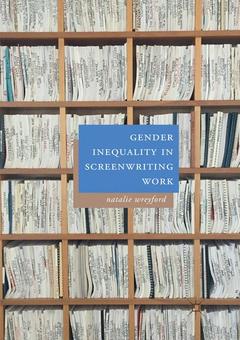Description
Gender Inequality in Screenwriting Work, Softcover reprint of the original 1st ed. 2018
Author: Wreyford Natalie
Language: English
Subject for Gender Inequality in Screenwriting Work:
Keywords
women; film; creativity; inequality; cinema; employment; film industry; jobs; imagination; injustice; gender; social change; filmmaking
Gender Inequality in Screenwriting Work
Publication date: 12-2018
Support: Print on demand
Publication date: 12-2018
Support: Print on demand
Gender Inequality in Screenwriting Work
Publication date: 10-2018
Support: Print on demand
Publication date: 10-2018
Support: Print on demand
Description
/li>Contents
/li>Biography
/li>Comment
/li>
This is the first book to critically examine the recruitment and working practices of screenwriters. Drawing on interviews with screenwriters and those that employ them, Natalie Wreyford provides a deep and detailed understanding of entrenched gender inequality in the UK film industry and answers the question: what is preventing women from working as screenwriters? She considers how socialised recruitment and gendered taste result in exclusion, and uncovers subtle forms of sexism that cause women?s stories and voices to be discounted. Gender Inequality in Screenwriting Work also reveals the hidden labour market of the UK film industry, built on personal connections, homophily and the myth of meritocracy. It is essential reading for students and scholars of gender, creative industries, film and cultural studies, as well as anyone who wants to understand why women remain excluded from many key roles in filmmaking.
1. Introduction: The extent of gender inequality in film screenwriting work.- 2. Gendering the screenwriter.- 3. Gender, capital and getting in.- 4. The gendered dynamics of the recruitment of screenwriters.- 5. The impact of motherhood on screenwriters.- 6. Being outnumbered.- 7. Gendering taste.- 8. Conclusions: Moving beyond numbers to make change happen.
Natalie Wreyford is Research Fellow on “Calling the Shots: Women and Contemporary UK Film Culture” at the University of Southampton, UK. She completed her PhD at King’s College London. Prior to this, she worked in screenplay development for many years, including at Granada Films and the UK Film Council.
Marks the first in-depth study to examine the reasons behind continued gender inequality in filmmaking professions Contains original research based on interviews with employers of screenwriters, as well as with a range of screenwriters themselves, some of whom have many produced films and awards Written from the unique position of someone who has worked in senior roles within the UK film industry for many years but who also has a deep understanding of academic writing on film and creative industries
© 2024 LAVOISIER S.A.S.



